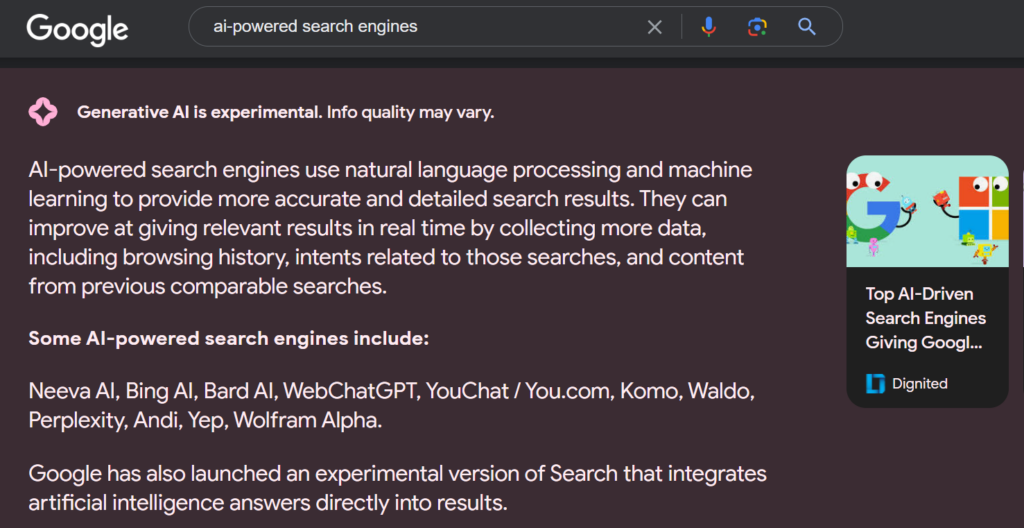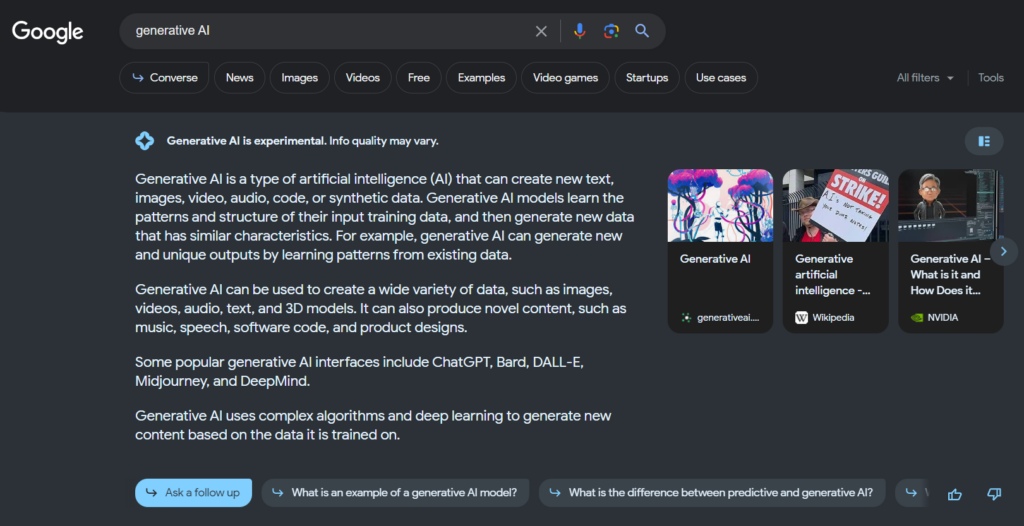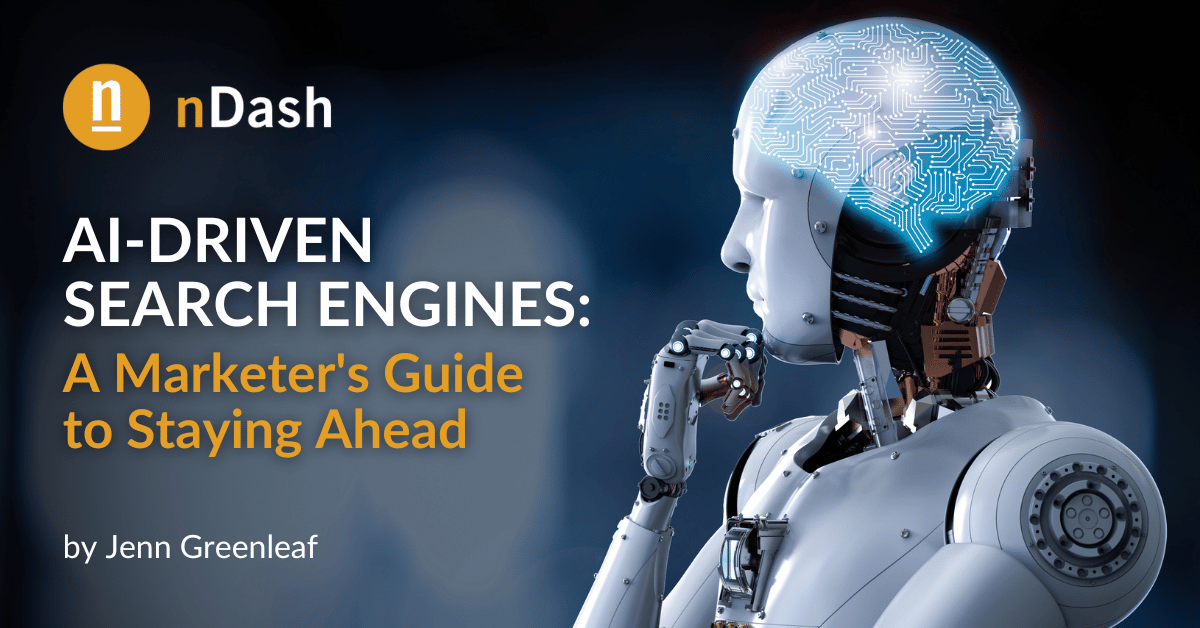Discover the future of AI-driven search engines and why staying informed is vital for marketers to drive brand success, differentiate with human-first content, and unlock new opportunities.
What is Google’s New Generative AI Search Engine
Early last month, Google started experimenting with a new AI-driven search engine called Search Generative Experience (SGE). Their goal? To take a new look at search engine capabilities and how AI plays in that space.
James Vincent, a senior reporter for The Verge, writes, “Google has been spurred into action by the popularity of Bing AI and ChatGPT as alternative search engines, and it’s experimenting with replacing its traditional ten blue links with AI-generated summaries.”
I received an email from Google asking if I wanted to experiment with “Labs.” Before that, I noticed a little beaker in the top right corner of my screen next to the settings cog. I didn’t think much of it – my first thought was that “Labs” was a tool for students and educators. So, I deleted the email.
To my surprise, clicking on that beaker led me to the AI-driven search engine experiment. A notice at the top indicates that the experiment is ending at the end of the year. So, we have some time to get our strategies in order, stay informed, and look at how to optimize for AI-driven search engines.
Why is it important for marketers to stay informed?
Marketers play a crucial role in driving brand success, and staying informed about the latest developments in AI-driven search engines is essential for maintaining a competitive edge.
Understanding the impact of AI on search engine algorithms empowers marketers to:
- optimize their strategies
- adapt their content creation process
- make data-driven decisions
- navigate potential challenges
Here’s an example of what search results look like when you add this feature to Google:

The Rise of Generative AI in Search Engines
So, one thing to keep in mind is that Google isn’t the only player in this space. Bing also has an AI-generated search engine. In early February, they released a beta version for desktop users powered by GPT-4. Then, later that month, they brought this technology to mobile and Skype users.
At nDash, we use Skype to communicate with each other throughout the day. So, I noticed immediately when the new chat icon from Bing appeared with the question, “How can I help you today?” There are also silly little prompts popping up daily, like “Invent a new soft drink” or “Generate a random crossword puzzle solution.”
With these innovations, what does this mean for search engine algorithms?
Traditionally, search engines have relied on keyword matching and other techniques to deliver results. But, AI-driven search engines take a different approach. The theory is that these “robots” are trained to deliver results based on user intent. In other words, when you type in keywords, you’re training the search engine to return more personalized results.
Is this true? Does it work?
Only time will tell (remember, we’re still in the very early stages of this particular experiment). It’s impossible for anyone to be an expert in this area because it’s still too new. Even though AI has been part of search engines for quite some time, it wasn’t to this extent.
For example, Google started using RankBrain in 2015 to help its search engine sort and deliver the most relevant results. The difference is we didn’t see a large block of text at the top of the screen containing an answer like we do today.
So, how can we tell if generative AI improves search engine results or user experiences?
As shown in the screenshot above, AI analyzes search engine results, generates a custom result, and shows you that result in something that looks like an enhanced featured snippet. Sometimes, you’ll see a short paragraph with bullet points and relevant links. Other times, you’ll see the beginnings of what looks like a short-form blog post. Here’s an example of how that looks:

Why Marketers Should Care
With the inundation of AI-generated content flooding the internet, there’s the potential for content degradation.
How?
Think of it this way – AI systems are trained on online content. Until the launch of AI-generated content creation tools, this content was primarily written by humans. Fast-forward to now, when some sites use AI to generate some or all of their content. It’s no longer “human” content; it’s synthetic content.
Researchers from Oxford University, Cambridge University, Imperial College of London, University of Toronto, and the University of Edinburgh wrote a paper entitled The Curse of Recursion, Training on Generated Data Makes Models Forget.
Their research states, “We discover that learning from data produced by other models causes model collapse – a degenerative process whereby, over time, models forget the true underlying data distribution, even in the absence of a shift in the distribution over time.”
So, what happens when AI starts using AI-generated content to train its models?
In short, this synthetic content causes these models to degrade. You might also hear this referred to as content cannibalization or plagiarism engines.
“Thinking about this idea of AI cannibalizing itself has made me more optimistic that humans still have a role to play on the internet,” says Casey Newton on a Hard Fork podcast episode entitled, Is A.I. Poisoning Itself? + Billionaire Cage Fight + Cooking With ChatGPT.
This degradation also flows back to search results – specifically, generative AI search. In other words, if language models start training themselves on content created from 2022 up until today, there’s a chance the results won’t be accurate or of the best quality.
“The answers in Google’s SGE boxes are frequently plagiarized, often word-for-word, from the related links. Depending on what you search for, you may find a paragraph taken from just one source or get a whole bunch of sentences and factoids from different articles mashed together into a plagiarism stew,” says Avram Piltch, editor-in-chief of Tom’s Hardware, in a recent write-up.
Staying Ahead: Actionable Tips for Marketers
There’s no question that AI-driven search engines are fast. But what happens if the “prompt expert” is inexperienced? It isn’t realistic to expect great results from someone who isn’t knowledgeable about the topic. It’s akin to giving a new driver the keys to a Formula 1 car – they won’t race like a pro.
So, what does this mean for marketers?
In a recent webinar with Sitecore, Ann Handley, Chief Content Officer at MarketingProfs, advised, “I think that it is incumbent on all of us to take a more measured and responsible approach to AI implementation and not just think about doing things faster, but actually just maybe slowing it down and taking a minute – taking a beat – to say, ‘All right, what do we need to do with these tools?'”
Because we can think of AI-driven search engines as tools, we must follow Ann’s advice. The following tips outline how marketers can stay ahead of the curve:
Embrace an Omnichannel Approach
By leveraging multiple channels – apps, email, social media, websites, and offline channels – you’re taking a customer-centric approach to creating a consistent and unified experience for your customers. In turn, that places focus on your customers and their needs instead of solely on your products and services.
This approach also helps your business increase its reach, improving the likelihood of increased engagement and loyalty. Take that a step further by integrating SEO, paid ads, conversion rate optimization (CRO), and content marketing. Generate unique content that speaks directly to those needs – examples include:
- Providing unique perspectives and new information to prevent your content from being generic – your audience doesn’t want to see something already on a dozen other websites.
- Compile customer quotes, testimonials, and reviews to add proof points and another layer of unique perspectives to your content.
- Embrace SEO best practices by adding relevant internal links, keywords, and meta descriptions. Use headings, bullets, and short paragraphs to ensure your content is readable and scannable.
nDash’s pool of freelance writers can help your brand achieve these goals. We also have managed service options, so you don’t have to worry about ideation, content calendars, workflows, and more.
Invest in Thought Leadership and Unique Content
As touched on briefly above, creating compelling and original content is critical for standing out. When you demonstrate your expertise, that helps build trust with your audience. Instead of depending on AI-driven search engines, your audience will turn to you for answers and expertise.
Examples of how to achieve this goal include:
- Share advice, insights, and opinions on your industry’s topics
- Get involved with your audience where they’re at – like answering questions in forums, responding to comments on social media, and hosting webinars with open Q&As at the end.
- Post updates about changes in your company – like new features and added services – then explain how those changes solve your audience’s pain points.
- Prove that you’ve done your research by sharing data, insights, and quotes from recent, relevant, and reputable sources. If you can’t find quotes from recent sources, then take a journalistic approach by interviewing subject matter experts. If you can’t find recent data, survey your audience on social media or outsource it to a market research company.
Think of thought leadership as an approach to content marketing rather than a type of content that’s found within it. You’re taking this approach to build your brand’s reputation by sharing insightful information that challenges assumptions. Consider this – in a 2021 LinkedIn-Edelman thought leadership survey, 81% of respondents stated they wanted “provocative insights that challenge their assumptions rather than validation on their current thinking.”
If your team runs lean, there might not be enough time to create this content. Last year, Nina McIntyre, ETQ’s former CMO, explained how nDash solved her team’s need for specialized content.
She explained, “At ETQ, we’re developing content for many different personas and industries — and while there are some general pieces, the vast majority of our content needs to address specialized concerns. The demand gen beast is a ravenous engine! Our content creation pace is fast, so we need to have fresh offers all the time. We’re very lucky we found nDash.”
Collaborate with Freelancers for AI-Proof Writing
We’ve all seen the headlines and advertisements – those that claim AI-generated content will outperform human-generated content created by freelance writers.
While it’s true that AI writing tools are faster, that doesn’t mean the content is better. Remember, these tools and AI-driven search engines are content scrapers. They’re not sharing anything new – instead, they’re taking what’s already said and spinning it into something that looks new.
The solution: Creating human-centered content.
It won’t be long before the internet is saturated with poor-quality content. It also won’t be long before we start seeing the same content popping up repeatedly when searching for answers. Let’s go back to that Hard Fork podcast – Kevin Roose gave a good example of this:
“Researchers have found that if you ask ChatGBT to tell you a joke and you ask it to do that a bunch of times, it will sort of land on the same 25 jokes over and over again. Those will be outputted much more frequently than any other jokes.”
He continues, “What that suggests is that if people are using ChatGBT to come up with things and then you’re publishing those things on the internet, and a future generation of chatbots comes back and scrapes that data, it’s going to be skewed toward these very probable outputs. A future chatbot might come along and think there are only 25 jokes in the whole world.”
Turning to freelance writers solves that problem because they’re creating something unique to your brand, not posted multiple times on other sites, and something your audience can trust as reputable information. Examples of this content include case studies, expert interviews, and other types of specialized content creation tasks.
How nDash Empowers Marketers in the Age of AI-Driven Search Engines
AI-driven search engines are here to say. So, marketers are challenged with staying ahead of the curve. nDash’s content creation services offer a solution by providing the expertise and resources necessary to navigate these challenges successfully. With an omnichannel approach, marketers can leverage multiple channels and create a consistent customer experience while investing in thought leadership and unique content to help establish trust and authority in the industry. Contact nDash today to learn more about adapting strategies, optimizing the content creation process, and making data-driven decisions.
